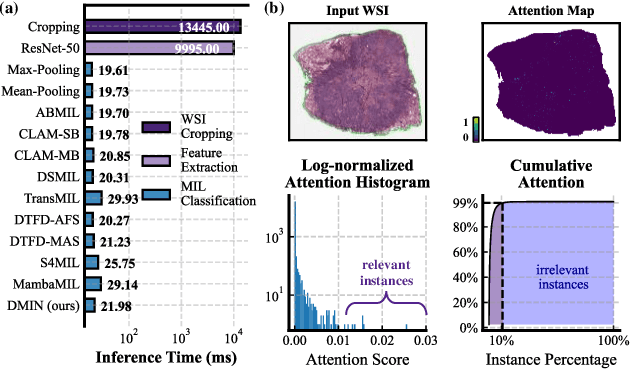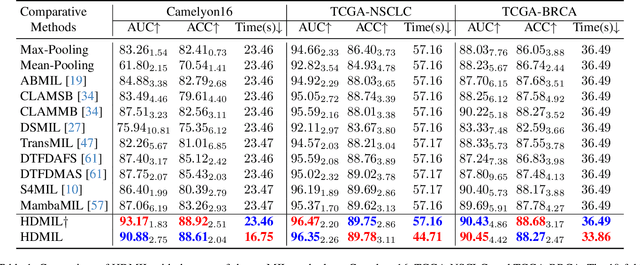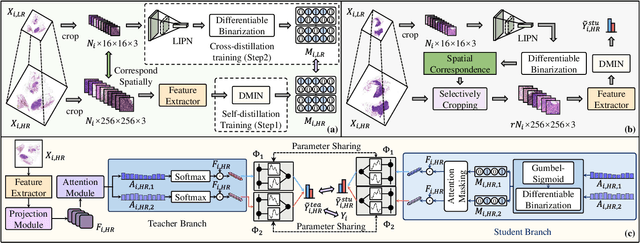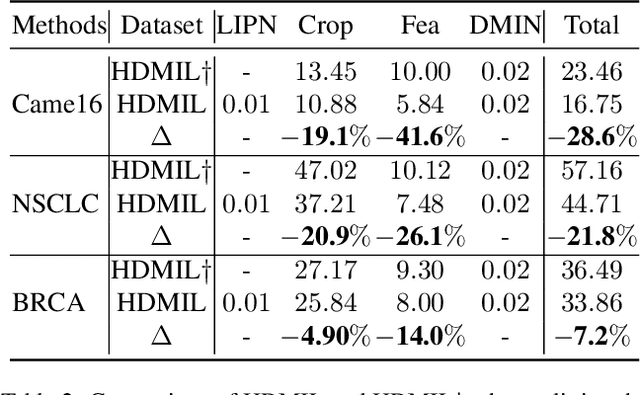Jiuyang Dong
AHDMIL: Asymmetric Hierarchical Distillation Multi-Instance Learning for Fast and Accurate Whole-Slide Image Classification
Aug 07, 2025Abstract:Although multi-instance learning (MIL) has succeeded in pathological image classification, it faces the challenge of high inference costs due to the need to process thousands of patches from each gigapixel whole slide image (WSI). To address this, we propose AHDMIL, an Asymmetric Hierarchical Distillation Multi-Instance Learning framework that enables fast and accurate classification by eliminating irrelevant patches through a two-step training process. AHDMIL comprises two key components: the Dynamic Multi-Instance Network (DMIN), which operates on high-resolution WSIs, and the Dual-Branch Lightweight Instance Pre-screening Network (DB-LIPN), which analyzes corresponding low-resolution counterparts. In the first step, self-distillation (SD), DMIN is trained for WSI classification while generating per-instance attention scores to identify irrelevant patches. These scores guide the second step, asymmetric distillation (AD), where DB-LIPN learns to predict the relevance of each low-resolution patch. The relevant patches predicted by DB-LIPN have spatial correspondence with patches in high-resolution WSIs, which are used for fine-tuning and efficient inference of DMIN. In addition, we design the first Chebyshev-polynomial-based Kolmogorov-Arnold (CKA) classifier in computational pathology, which improves classification performance through learnable activation layers. Extensive experiments on four public datasets demonstrate that AHDMIL consistently outperforms previous state-of-the-art methods in both classification performance and inference speed. For example, on the Camelyon16 dataset, it achieves a relative improvement of 5.3% in accuracy and accelerates inference by 1.2.times. Across all datasets, area under the curve (AUC), accuracy, f1 score, and brier score show consistent gains, with average inference speedups ranging from 1.2 to 2.1 times. The code is available.
Fast and Accurate Gigapixel Pathological Image Classification with Hierarchical Distillation Multi-Instance Learning
Feb 28, 2025



Abstract:Although multi-instance learning (MIL) has succeeded in pathological image classification, it faces the challenge of high inference costs due to processing numerous patches from gigapixel whole slide images (WSIs). To address this, we propose HDMIL, a hierarchical distillation multi-instance learning framework that achieves fast and accurate classification by eliminating irrelevant patches. HDMIL consists of two key components: the dynamic multi-instance network (DMIN) and the lightweight instance pre-screening network (LIPN). DMIN operates on high-resolution WSIs, while LIPN operates on the corresponding low-resolution counterparts. During training, DMIN are trained for WSI classification while generating attention-score-based masks that indicate irrelevant patches. These masks then guide the training of LIPN to predict the relevance of each low-resolution patch. During testing, LIPN first determines the useful regions within low-resolution WSIs, which indirectly enables us to eliminate irrelevant regions in high-resolution WSIs, thereby reducing inference time without causing performance degradation. In addition, we further design the first Chebyshev-polynomials-based Kolmogorov-Arnold classifier in computational pathology, which enhances the performance of HDMIL through learnable activation layers. Extensive experiments on three public datasets demonstrate that HDMIL outperforms previous state-of-the-art methods, e.g., achieving improvements of 3.13% in AUC while reducing inference time by 28.6% on the Camelyon16 dataset.
 Add to Chrome
Add to Chrome Add to Firefox
Add to Firefox Add to Edge
Add to Edge